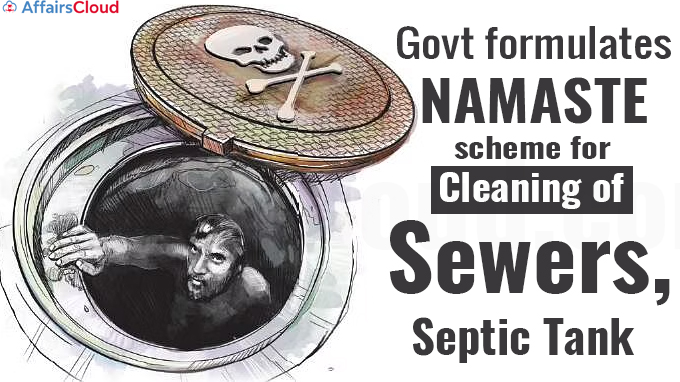
The Government of India (GoI) has developed a National Action Plan for Mechanized Sanitation Ecosystem – NAMASTE scheme to achieve zero sanitation fatalities in India and to ensure that all sanitation work is undertaken by skilled workers.
- The NAMASTE project is a collaboration between the Ministry of Social Justice and Empowerment (MoSJE) and the Ministry of Housing and Urban Affairs (MoHUA).
Backdrop
i. The NAMASTE scheme replaces the Self Employment Scheme for Rehabilitation of Manual Scavengers (SRMS) which was introduced in January, 2007.
ii.The “NAMASTE” roadmap has been approved by the Standing Finance Committee (SFC), which is chaired by Secretary for Social Justice and Empowerment R. Subrahmanyam.
iii. It will be implemented from 2022 to 2026 in 500 cities and townships that have already been notified under the Atal Mission for Rejuvenation and Urban Transformation (AMRUT), which aims to provide basic quality of life services to cities.
NAMASTE Project Aims to Achieve the Following Outcomes:
- Zero fatalities in sanitation work in India.
- All sanitation work must be done by skilled workers.
- No sanitation workers should come into direct contact with human fecal matter.
- Sanitation workers are to be organized into Self-Help Groups (SHGs) and empowered to manage sanitation enterprises.
- Alternative livelihoods should be made available to all sewer and Septic Tank Sanitation Workers (SSWs).
- Increased enforcement and oversight of safe sanitation work through enhanced supervisory and monitoring mechanisms at the national, state, and ULB (Urban Local Bodies) levels.
- Improved knowledge among individuals and institutions seeking sanitation services to use registered and qualified sanitation workers.
Key Points:
i. Additionally, the Faecal Sludge and Septage Management (FSSM) Policy, 2017, published by MoHUA, promotes safe and sustainable sanitation.
- It emphasizes the implementation of legal prohibition of manual scavenging under the Prohibition of Employment as Manual Scavengers and their Rehabilitation Act of 2013.
- As of December 6, 2013, manual scavenging is prohibited, and no person or agency can engage or employ any person for such work.
ii.The Standard Operating Procedure (SOP) for safe cleaning of sewer and septic tanks was mandated in November 2018.
iii. According to the Supreme Court’s judgement from its ruling in Civil Writ Petition No. 583 of 2003 on March 27, 2014, the State Governments have been required to compensate the families of people who have died while cleaning sewers/septic tanks since 1993 with a sum of Rs. 10 lakh each.
- Such compensation payments have been made possible by the Department of Social Justice, MoSJE and the National Commission for Safai Karamcharis.
iv.The Government e-Marketplace (GeM) portal hosts the types of machineries and core equipment that the GoI has shortlisted for maintenance tasks as well as safety gear for SafaiMitras.
v.The National SafaiKaramchari Finance Development Corporation is working with the MoSJE to facilitate SafaiMitra skill development and training.
Recent Related News:
On June 3, 2022, Union Minister Dr. Virendra Kumar, Ministry of Social Justice and Empowerment (MoSJE), launched the Scheme for Residential Education for Students in High Schools in Targeted Areas (SHRESHTA), at an event in Noida, Uttar Pradesh.
- SHRESHTA was created in response to the Constitutional mandate to provide quality education and opportunities for even the poorest Scheduled Caste (SC) students.
About Ministry of Social Justice and Empowerment (MoSJE):
Union Minister – Dr. Virendra Kumar (Tikamgarh Constituency, Madhya Pradesh)
Minister of State (MoS) – Ramdas Athawale ; A. Narayanaswamy ; Pratima Bhoumik




